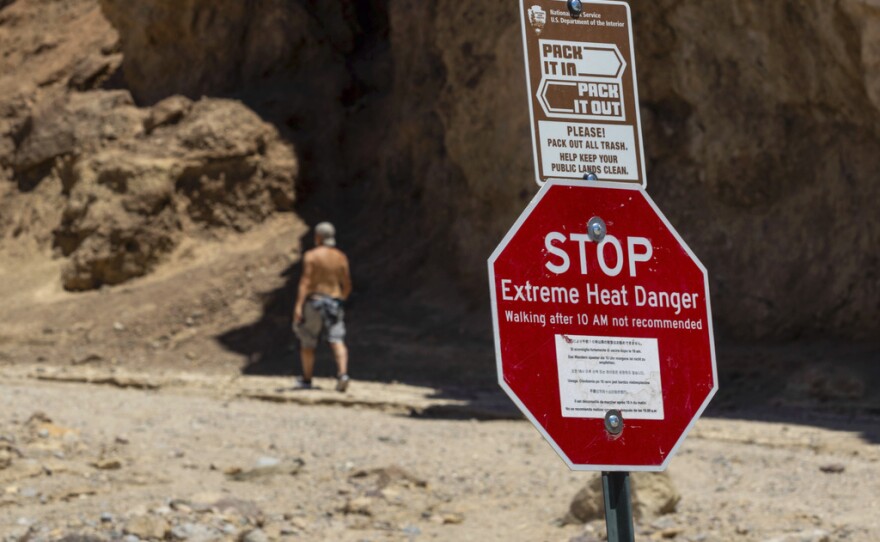The first heat wave of the season is bringing triple-digit temperatures earlier than usual to much of the Southwest U.S., where forecasters warned residents Tuesday to brace for “dangerously hot conditions” with highs expected to top 110 degrees Fahrenheit in the days ahead in Las Vegas and Phoenix.
By Wednesday, most of an area stretching from southeast California to central Arizona will see “easily their hottest” weather since last September, and record daily highs will be in jeopardy throughout the region, the National Weather Service said.
Excessive heat warnings have been issued from 10 a.m. Wednesday to 8 p.m. Friday for parts of southern Nevada and Arizona. The unseasonably hot weather is expected to make its way into parts of the Pacific Northwest by the end of the week.
“We're looking at high temperatures well in the 90s and 100s, temperatures well above average for the time of year — some spots as much as 10 to 20 degrees above average,” National Weather Service meteorologist Marc Chenard in College Park, Maryland, said Tuesday.
Southeast California, southern Nevada and much of Arizona will be affected most, he said.
“As we go through the week, some of those higher temperatures are also going to spread north, potentially getting into portions of the Pacific Northwest as well,” Chenard said.
“We do have several days where these temperatures will persist, and that usually adds to the impact. If there is just one day, it doesn't tend to have as much of an impact,” he said. “But when you start getting two, three or four days this heat and then even warm temperatures at night, you start to see the impact increase.”
The unseasonably hot weather already has taken a toll in some areas. The U.S. Border Patrol reported on Monday that four migrants died last weekend from heat-related causes while attempting to cross the border in southeast New Mexico, near El Paso, Texas.
Border Patrol El Paso Sector Chief Anthony Good urged migrants not to try to cross the border in the extreme heat.
“The desert environment is extremely unforgiving, especially during the summer months,” Good said. “We urge anyone considering crossing illegally to understand the severe risks involved”
Fire crews will be on high alert especially in Arizona, where fire restrictions went into effect before Memorial Day in some areas and will be ordered by Thursday across most of the western and south-central parts of the state, authorities said.
Fire forecasters at the Southwest Coordination Center in Albuquerque, New Mexico, said weather in the region doesn’t typically become so hot until mid- or late June.
“It does seem like Mother Nature is turning up the heat on us a little sooner than usual,” Tiffany Davila, spokesperson for the Arizona Department of Forestry and Fire Management, said Monday evening.
“We can’t back down from a fire just because it’s pushing 113 degrees outside. But we do keep a close eye on everybody in the field. Make sure they are keeping hydrated and taking more breaks than they normally would," she told The Associated Press.
Highs on Monday reached 110 F at Death Valley National Park in California near the Nevada line, 103 F in Phoenix and 105 F in Needles, California.
In Las Vegas, where the high topped out at 103 F on Monday, temperatures will soar to 10 to 15 degrees above normal during the second half of the week — peaking at 111 on Thursday.
A high of 120 F is forecast for Thursday at Furnace Creek in Death Valley.
The current forecasted high of 113 F for Phoenix on Thursday would break the daily record high of 111 F set in 2016.
Last summer, Phoenix saw a record 31 straight days of at least 110 degrees F, stretching from the last day of June through the entire month of July. At least 400 of the 645 heat-related deaths that occurred last year were during that monthlong period.
Phoenix, Maricopa County and Arizona state officials this year are striving to better protect people from ever higher temperatures. Those most in danger from the heat are people outdoors, especially homeless people in downtown areas who often don’t have access to sufficient shade, air conditioning and cold water.
Governments this year are setting aside more money so cooling stations can stay open longer and on the weekends, including two that will keep their doors open overnight.
Mesa, Arizona, Mayor John Giles said they are "committed to ensuring that those most vulnerable to heat exposure have access to essential life-saving services, including hydration and cooling stations and daytime respite centers.”
Associated Press writers Jim Vertuno in Austin, Texas and Donna Warder in Washington, D.C., contributed to this report. Sonner reported from Reno.







